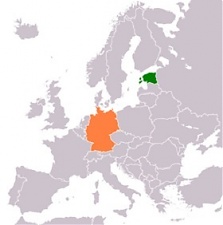Analytics, Baltic Export, Banks, Cooperation, Estonia, EU – Baltic States, Industry
International Internet Magazine. Baltic States news & analytics
Friday, 26.04.2024, 00:51
SEB: Estonian companies' export to Germany should be more diverse
 Print version
Print version |
|---|
Germany's economic growth decelerated to 1.5% last year, the country's statistical office said on Tuesday. It appears from data available from the federal statistical office Destatis that the German economy grew last year for the ninth year in a row, but the growth was significantly slower than in 2016 and 2017, when the growth was 2.2%.
According to Nestor, German economy is very important for Estonia. "Last year, 7% of goods produced here moved there, thus making it the third most important trade partner. Something at least equally as important -- Germany is the most important destination for our main trade partners Finland and Sweden, which, in turn, means that several Estonian companies are exporting to Germany indirectly, through value chains running through the Nordic countries," the analyst said in a press release.
The main articles of goods transported from Estonia to Germany are electrical and medical equipment, wood products, furniture and ready-made houses, which make up approximately two thirds of the export heading in that direction. Even though among these are both goods meant for the German domestic market and goods to be exported further from there, then looking at the current trends in the German economy, there is reason to assess conservatively the growth potential of both, Nestor said.
"The objective of the next few years should definitely be diversifying the export in the direction of Germany, as, considering the size and wealth of the market, anyone can find their niche there," the analyst said.
Commenting on the deceleration of Germany's economic growth, Nestor said that this was not only caused by problems in the industry and export. "Namely, private consumption has also strongly decelerated, which, when subtracting the impact of inflation, increased by only one percent last year. Compared with 2017, the growth was slower by nearly a half. The last time the Germans were this conservative in increasing their spending was in 2014," he said.
Nestor added that the German consumer confidence, which after a high in January decreased consistently last year, does not bode well for the starting year, either.
At the same time, the growth of foreign trade also decelerated last year. While in 2017, Germany's export rose 4.6%, then the indicator slowed to 2.4% in 2018.
"Unlike other large countries, export is nearly as important for the German economy as private consumption, making up half of the country's GDP -- an exceptionally large rate for such a large economy. For the most part, the reason behind the slower export growth was a nearly 10% drop in trade in the direction of China. However, an equal blow was dealt by a drop in the export to the Netherlands. Export to Germany's largest trade partner, the US, also slowed and remained on the same rate as the year before in the direction of France," the SEB analyst said.
Nestor specified that China's role in the German economy is important because Chinese demand has promoted the Germany industry namely in the longer perspective, being the largest contributor to the increase in Germany's export in the last 10 years.
"By now, the continuation of a similar growth tempo in the future has become questionable. On the one hand, the Chinese economy is slightly reducing speed and the anxious state in trade policy is not exactly an encouraging sign for the companies there to make investments into expensive German technology. On the other hand, the economy of China is in the process of changing in terms of structure -- further growth is not so much based on export and investment, but consumption. In addition, China's technological level is becoming increasingly higher and the need for machinery and devices built by Germans increasingly lower," he said.
At the same time, Nestor emphasized that the current situation in Germany is no unexpected ravine. "To expect one of the wealthiest countries in the world to have a more than 2%t annual increase in GDP is clearly excessive and rather, the economy there is moving back to a long-term growth path. The main thing is that a conservative German not overreact in light of today's negative news feed," he said.








 «The Baltic Course» Is Sold and Stays in Business!
«The Baltic Course» Is Sold and Stays in Business!

